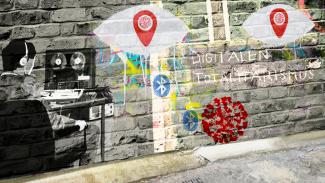Privacy and technologies to control COVID-19: the situation of Latin America
The COVID-19 crisis has led many governments to enable digital technologies to keep track and control people with this coronavirus. In our continent, we can find examples as mobile applications, websites, or even drones. Are these technologies harmonious with human rights? As in many places in the world, controversy has burst in Latin America.
In mid-March 2020, organizations belonging to Al Sur released a public statement stating that "the use of digital technologies to fight against this pandemic cannot exclude an examination of necessity and proportionality in the event of possible effects on our fundamental rights. In this line, all technology used in the context of this pandemic must prioritize reliable protection of our personal and sensitive data, enabling accountability procedures, and guarantee its limited use only within the state of emergency. All these measures are also crucial to avoid disproportionate impacts on the discrimination of the most vulnerable groups and the mental health and possible stigma of people affected by COVID-19".
Throughout these weeks, we have seen worrying initiatives in countries like Ecuador and Uruguay. For this reason, various organizations within Al Sur have analyzed different technologies deployed due to the pandemic in their countries. These analyses are an updated overview of what is happening in the region regarding privacy and data protection:
Argentina: Various apps to control the pandemic have been launched in Argentina, such as CuidAR at the national level, or in provinces as Tierra del Fuego (TDFUnida) and Mendoza (Co-Track). The Asociación por los Derechos Civiles (ADC) shared different concerns about the adoption of these technologies, including (1) that the incorporation of technology must always be justified based on scientific evidence; (2) that every app should be guided by the principle of minimizing the information that is collected, stored and processed; (3) that it is essential to analyze the broader impacts that the implementation of technology can represent for society.
Brazil: States and municipalities are using geolocation to monitor social distancing. Through data supplied by telecommunications companies, they can know if people are staying at home. For InternetLab and Coding Rights, there are concerning aspects as the lack of consent for the use of data, the lack of clarity with the purpose of its collection, anonymization of data, etc. Along the same lines, IDEC proposes concrete guidelines for the use of data, to achieve a balance between the need to use it and its effectiveness for specific and concrete purposes in the pandemic. InternetLab also released an analysis of the privacy risks of government apps against the pandemic. At the same time, Coding Rights is tracking bills presented in Congress related to COVID-19 and technology.
Chile: Derechos Digitales analyzed CoronApp, an application launched by the Chilean government. Among its findings are the unnecessary collection of data by the app and that its privacy policy is somewhat negligent. The app does not provide clarity about how the information collected will be removed or destroyed, nor the period in which this will happen. Derechos Digitales also highlight the little consideration that has been given to the conditions of access to infrastructure and connectivity necessary for its use.
Colombia: Fundación Karisma made a technical analysis of the applications and websites designed by both the national and local governments in the context of controlling the current pandemic: two applications (CoronApp - Colombia and CaliValle Corona) and the webform "Medellín me cuida." Their findings were, among others, that the purpose of these initiatives seems more focused on collecting information without justification nor privacy safeguards. Likewise, the absence of concrete information about whether these data will be erased once the emergency ends is also worrying for Karisma. Besides, Karisma, together with other local organizations, launched the Coronavirus and Digital Rights Index.
Paraguay: The Paraguayan government is working on a mobile application that would monitor quarantine compliance and has indicated that drones will be used to monitor compliance with sanitary measures. TEDIC has requested that the Paraguayan state carry out a preliminary study on the impact on human rights that a measure like implementing drones could have, as well as the necessity to make the process and the decisions transparent and accountable to citizens.
Peru: Hiperederecho has monitored the application "PerúEnTusManos - Detén el avance del COVID19" released by the Peruvian government. The main concern is the lack of specific rules and detailed information for users on how data will be used. It is not clear in which cases the identity of a person will be associated with its device and who will make that decision. There is also no concrete info on how to report non-compliance with these rules or technical vulnerabilities. Recently, Hiperederecho launched COVID-1984, an initiative to study how digital technologies in the context of COVID-19 are affecting rights in Peru.
In a collective effort to share methodology and findings, Al Sur members are monitoring how privacy and data protection are being affected by the use of technologies in the context of COVID-19 in our continent. We periodically will release info on this regard in our website as in our social media.



